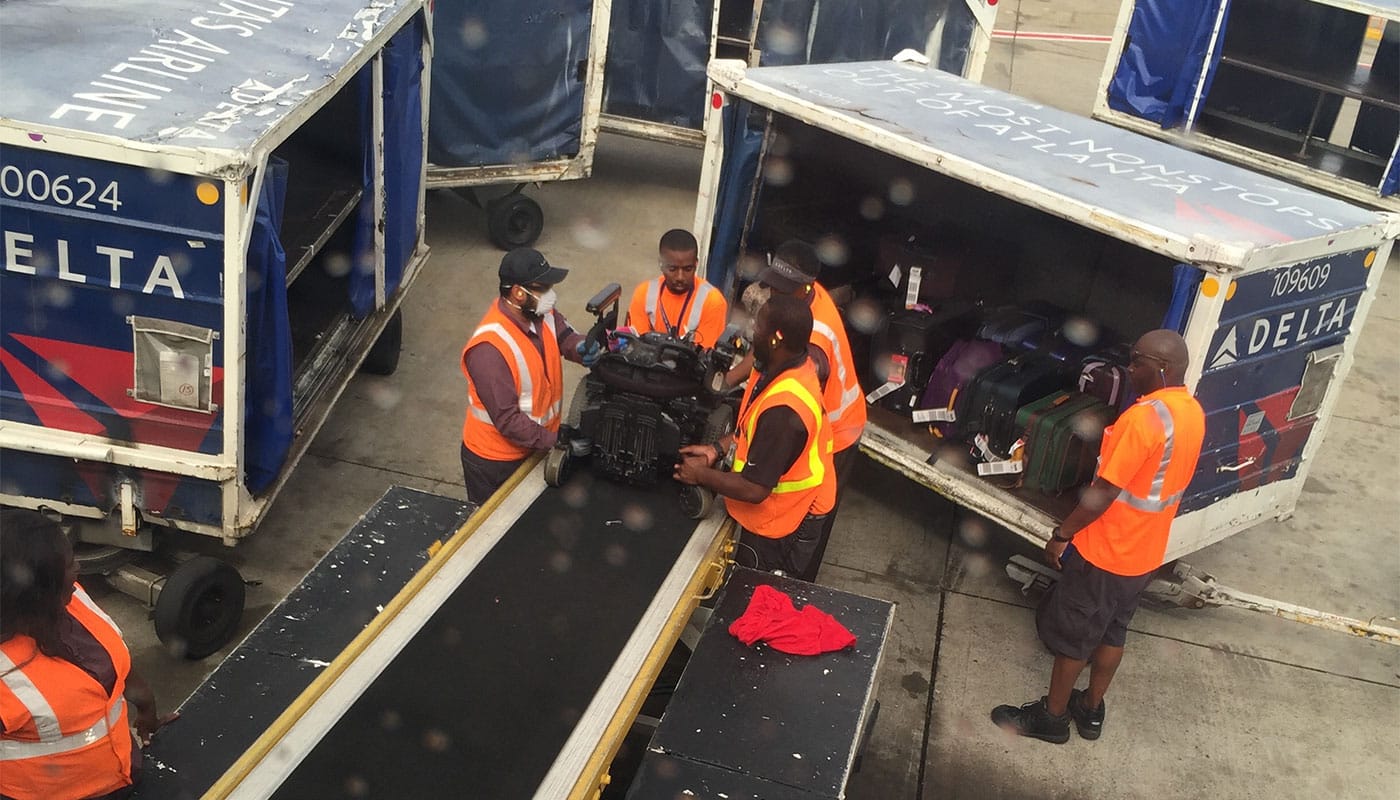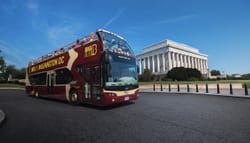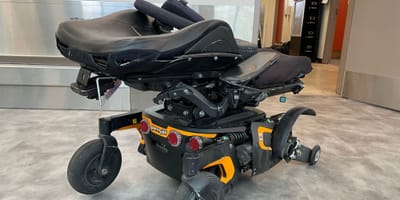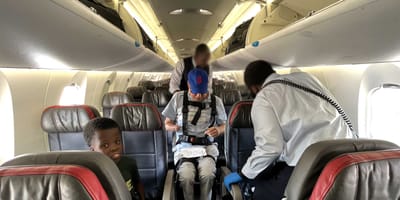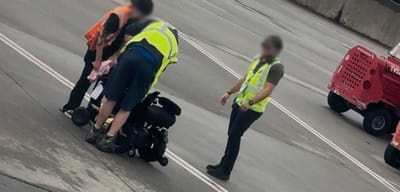The Air Carrier Access Act affords travelers with disabilities the right to gate-check mobility equipment on flights to, from or within the United States. Airlines must “…provide for the checking and timely return of passengers’ wheelchairs, other mobility aids, and other assistive devices as close as possible to the door of the aircraft.” Airlines fail to comply with this regulation so often that it is among the 3 Most Violated Accessibility Rules in Air Travel. The question is, why does this happen?
The case of the surprised baggage handler
Information is key in the airline industry. Air carriers maintain manifests of both passengers and cargo, which are used by the destination airport to plan for the arrival of a given flight. Passenger manifests contain more than names—frequent flyer status, meal requests, allergies and special service requests are included as well.
But the same is also true for cargo. Airlines generate a ton of revenue from the transportation of cargo. While airplane baggage compartments contain passengers’ luggage, airlines also transport things like postal mail, perishable goods, bulk items and other consumer goods. The type, size and weight of cargo, together with instructions for its handling, is dispatched to the ground crew at the flight’s destination.
Wheelchairs and other gate-checked mobility equipment should not only be listed on cargo manifests, but they should be prioritized. Doing so would help airlines comply with the following Air Carrier Access Act regulation:
“In order to achieve the timely return of wheelchairs, you must ensure that passengers’ wheelchairs, other mobility aids, and other assistive devices are among the first items retrieved from the baggage compartment.“
Moments after an arriving airplane has parked at the gate, ground crew will begin to open the aircraft’s cargo doors. Looking out my window, I will often see baggage handlers exhibit frustration, with some even using curse words when they discover my power wheelchair in the hold. They didn’t know my wheelchair was on the flight, because it had not been included on the flight manifest. And, as a result, my wheelchair is delayed in its return—a very clear violation of the ACAA (and my civil rights).
U.S. carriers don’t have/won’t use AmbuLifts
In the United States, the responsibility for returning mobility equipment lies squarely on the shoulders of the airlines. Many foreign carriers have invested in high loaders, also known as AmbuLifts. The AmbuLift is designed much like a catering truck, and it is able to transport wheelchairs and passengers from the ground to the aircraft cabin in an almost barrier-free way.
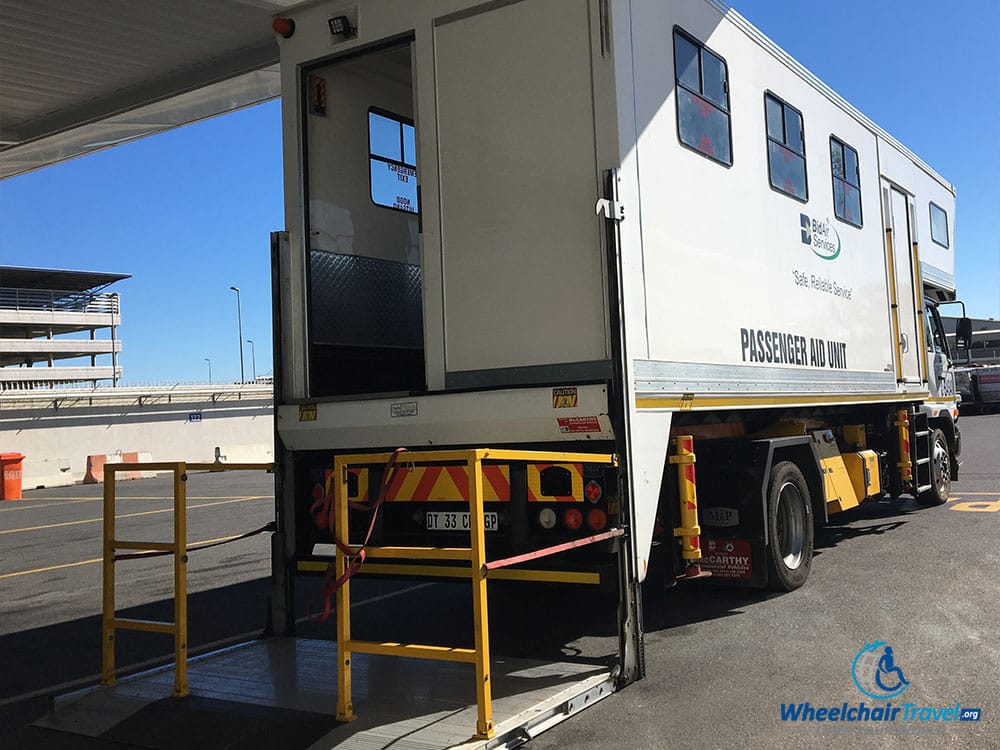
In many foreign airports, like London-Heathrow, AmbuLifts collect powered wheelchairs from the cargo hold and, within a few minutes, deliver it to the 1R or 2R door of the aircraft. The wheelchair is then pushed through the airplane and into the jet bridge, where it can be reconnected with its owner. The process takes less than 10 minutes, if the equipment is in place and the ground crew prepared for the flight’s arrival.
U.S. carriers often refuse to use AmbuLifts at the airports the have them, and never use them in the United States. If airlines like American, Delta and United were serious about ACAA compliance, they would have a fleet of AmbuLifts at every major airport in the country.
Improper training, laziness for international arrivals
Upon returning to the United States from abroad, I can’t count how many times airlines have told me that my wheelchair couldn’t be returned to the gate. The message is the same, regardless of carrier—it must be retrieved at customs/baggage claim, Customs & Border Patrol won’t release the chair to gate, etc. These are all lies.
U.S. Customs and Border Patrol will not hold a wheelchair hostage or deny it from passengers who have a legal right (per the ACAA) to receive it at the aircraft. Typically, the baggage handlers put it on a cart and send it to baggage claim, where CBP then holds it until the passenger arrives.
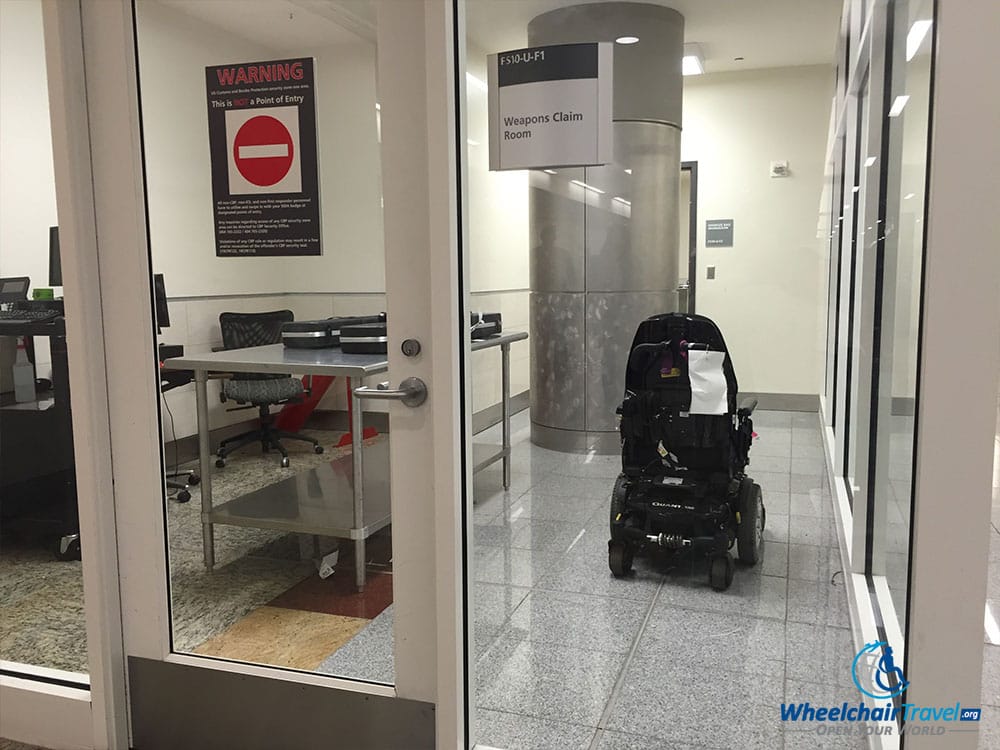
But, there is no requirement for the airline to send the wheelchair to customs in the first place. They will simply need to call a CBP agent to supervise its transfer from the ramp to the jet bridge. Most airlines are too concerned with going through these steps, and send it to customs to get rid of the problem.
Don’t back down. Tell the airline to retrieve your wheelchair. Ask to speak to a CBP agent. Call for a Complaint Resolution Official. Ask to speak with the airline’s station manager. And never, ever get off the plane until your wheelchair is delivered to the jet bridge. If you follow these steps and insist on your rights being upheld, you’ll get your wheelchair back. It is my view that a U.S. Citizen should never be denied his/her wheelchair and be pushed across the border of his/her own country. Do not allow airlines to dehumanize you in this way.
Airlines are complacent
Before switching to American Airlines, I used to travel with Delta Air Lines and faced ACAA violations on the majority (greater than 50%) of my flights. The most frequently violated regulatory requirement was the “timely return of passengers’ wheelchairs.”
I wrote the airline countless times, each e-mail outlining the problem, providing suggestions for improvement and containing an offer to help them address it. In addition, I spoke with numerous Delta executives (Senior Vice Presidents!) in-person and face-to-face, alerting them of this same information. Nothing ever got better. And, as far as I know, the executives never took any action in response to my concerns.
The truth is, the airlines haven’t been motivated to take action. The Department of Transportation is weak on enforcement, and they rarely take action in response to the violations of the rights of disabled travelers.
Slow return of your wheelchair? Here’s what to do.
If the return of your wheelchair has been delayed on arrival, follow these steps to make the airline industry know they are failing travelers with disabilities:
- File a disability complaint with the airline directly. This can usually be done through the airline’s website via a comment or complaint form. Demand a response, and cite your experience as “a violation of my rights under the Air Carrier Access Act, 14 CFR Part 382.” If you include this language, the airline will be required to respond to you in writing within 30 days. An e-mail response is acceptable.
- File a complaint with the U.S. Department of Transportation. Instructions on how to do so are available HERE. The airline will then be required to respond to the DOT. Following the airline’s response, the DOT will open an investigation and reply to you within 3-4 months with their determination. DOT complaints form the basis of fines levied against airlines for disability discrimination, so this is the most important step!
- Bookmark this page and share your story with me. As someone who is fighting the good fight for people with disabilities on a daily basis, I want to hear about the challenges travelers like you are facing. Please share your story about the delayed return of a gate-checked wheelchair in the comments below. I’d also like to know if you were forced to collect your wheelchair somewhere other than at the aircraft door/in the jet bridge.
Bringing light to the many instances of disability discrimination in air travel will increase the pressure on air carriers to comply with the law, advancing our mission of making air travel accessible to everyone.

